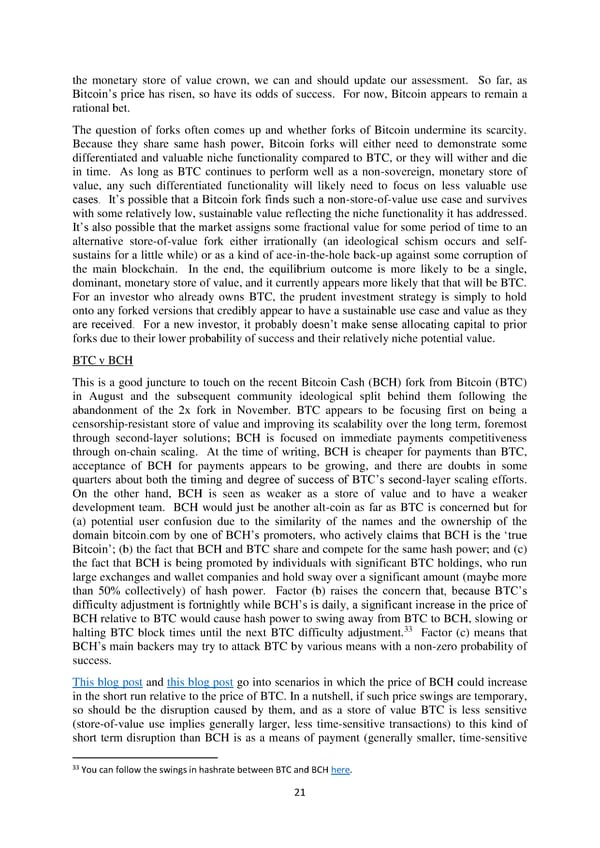the monetary store of value crown, we can and should update our assessment. So far, as Bitcoin’s price has risen, so have its odds of success. For now, Bitcoin appears to remain a rational bet. The question of forks often comes up and whether forks of Bitcoin undermine its scarcity. Because they share same hash power, Bitcoin forks will either need to demonstrate some differentiated and valuable niche functionality compared to BTC, or they will wither and die in time. As long as BTC continues to perform well as a non-sovereign, monetary store of value, any such differentiated functionality will likely need to focus on less valuable use cases. It’s possible that a Bitcoin fork finds such a non-store-of-value use case and survives with some relatively low, sustainable value reflecting the niche functionality it has addressed. It’s also possible that the market assigns some fractional value for some period of time to an alternative store-of-value fork either irrationally (an ideological schism occurs and self- sustains for a little while) or as a kind of ace-in-the-hole back-up against some corruption of the main blockchain. In the end, the equilibrium outcome is more likely to be a single, dominant, monetary store of value, and it currently appears more likely that that will be BTC. For an investor who already owns BTC, the prudent investment strategy is simply to hold onto any forked versions that credibly appear to have a sustainable use case and value as they are received. For a new investor, it probably doesn’t make sense allocating capital to prior forks due to their lower probability of success and their relatively niche potential value. BTC v BCH This is a good juncture to touch on the recent Bitcoin Cash (BCH) fork from Bitcoin (BTC) in August and the subsequent community ideological split behind them following the abandonment of the 2x fork in November. BTC appears to be focusing first on being a censorship-resistant store of value and improving its scalability over the long term, foremost through second-layer solutions; BCH is focused on immediate payments competitiveness through on-chain scaling. At the time of writing, BCH is cheaper for payments than BTC, acceptance of BCH for payments appears to be growing, and there are doubts in some quarters about both the timing and degree of success of BTC’s second-layer scaling efforts. On the other hand, BCH is seen as weaker as a store of value and to have a weaker development team. BCH would just be another alt-coin as far as BTC is concerned but for (a) potential user confusion due to the similarity of the names and the ownership of the domain bitcoin.com by one of BCH’s promoters, who actively claims that BCH is the ‘true Bitcoin’; (b) the fact that BCH and BTC share and compete for the same hash power; and (c) the fact that BCH is being promoted by individuals with significant BTC holdings, who run large exchanges and wallet companies and hold sway over a significant amount (maybe more than 50% collectively) of hash power. Factor (b) raises the concern that, because BTC’s difficulty adjustment is fortnightly while BCH’s is daily, a significant increase in the price of BCH relative to BTC would cause hash power to swing away from BTC to BCH, slowing or halting BTC block times until the next BTC difficulty adjustment.33 Factor (c) means that BCH’s main backers may try to attack BTC by various means with a non-zero probability of success. This blog post and this blog post go into scenarios in which the price of BCH could increase in the short run relative to the price of BTC. In a nutshell, if such price swings are temporary, so should be the disruption caused by them, and as a store of value BTC is less sensitive (store-of-value use implies generally larger, less time-sensitive transactions) to this kind of short term disruption than BCH is as a means of payment (generally smaller, time-sensitive 33 You can follow the swings in hashrate between BTC and BCH here. 21
 Investor’s Take on Cryptoassets by John Pfeffer Page 20 Page 22
Investor’s Take on Cryptoassets by John Pfeffer Page 20 Page 22